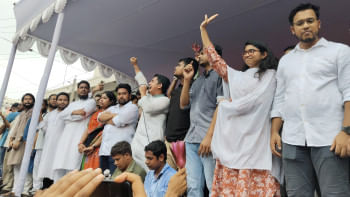‘Always wanted to be a changemaker’

Shwapna Bhowmick, Bangladesh country manager for Marks & Spencer (M&S), said she always wanted to be a changemaker. Be it small or otherwise, she always felt the urge to effect changes while representing Bangladesh through garment products.
"Meaningful change has been my only goal since childhood and that's what I really want to focus on," she added.
With this mindset, Bhowmick not only achieved personal esteem, but has also brought drastic changes to the country's garment industry.

After securing a post-graduate degree in philosophy from the University of Dhaka, she decided to pursue a different career and got herself admitted to the BGMEA University of Fashion & Technology (BUFT), previously known as the BUFT Institute of Fashion & Technology (BIFT).
Although her father discouraged the pursuit of a career in a male dominated industry, Bhowmick underwent an internship with a garment factory after completing her diploma in fashion merchandising at BUFT.
"I remember standing in the middle of the factory, where I saw 50 per cent female workers but not a single female executive. That was the trigger point for me and I knew that I want to work in this industry and bring change," she said.
Having joined the leading multinational retail company as a merchandiser in 2006, Bhowmick was promoted to country manager in December 2013.
Even though 80 per cent of the workers at garment factories are women who are capable of taking responsibilities, very few are given leadership roles.
"There are many obligations when it comes to working after designated hours but things are changing. Now, we have more than 200 women in various leadership positions in the industry," she said.
For aspiring women entrepreneurs, Bhowmick had one suggestion.
"Have conversations with yourself. Ask yourself whether you want to see yourself in that place you aspire to be. If you really want to reach there, everyone will support you," she said.
She went on to say that the stereotypical ecosystem will not transform overnight, it will take a long time to change.
The M&S top brass also suggested that they should start working from the ground up even though everyone wants to begin their careers with a white-collar job.
"After joining a factory, seeing the process of making yarn from cotton, making cloth from yarn -- such experiences still help me significantly," she said.
"Don't give up. You have to run twice as fast as the person beside you. Otherwise, you'll fail and that's reality," Bhowmick added.
The changemaker also believes in assimilating with the challenges of the ongoing digital transformation worldwide.
"To adapt with these changes, making yourself relevant is important," the M&S country manager said.
At the very beginning of the coronavirus pandemic, when people started to work from home, the garment industry faced a struggle to survive.
There is an old Chinese philosophy that's reflected in Sun Tzu's book 'The Art of War': "In the midst of chaos there is opportunity".
And similarly, M&S also found opportunity amid the Covid-19 fallout as it turned out that the gap in demand for formal products could be covered by the increased demand for casual wear.
The leading brand then successfully delivered these products in a customised and safe way.
"Ensuring the healthcare of workers, re-establishing manufacturers' activities and delivering a product is a huge success for us and a huge industry like ours will survive," Bhowmick said.
The pandemic also changed the traditional forms of communication and therefore, fresh initiatives were needed to develop the peoples' skillset and digital competency.
"The traditional way was buyers come and visit a factory and select products but during the pandemic, it's completely virtual and a new skill needed to be developed among team members," she said.
The country manager also emphasised on the need for re-skilling people like formal garment workers.
During the very beginning of pandemic, besides ensuring the health safety of workers, Bhowmick initiated the production of personal protective equipment (PPE) for healthcare providers.
Around one lakh PPEs were distributed among doctors and nurses all over the country and several voluntary organisations offered support. After completing her studies, Bhowmick began her career with Renaissance Group's Araf Apparels and then joined Next, a British multinational clothing brand, as assistant merchandiser before a lateral move to Walmart.
Bhowmick is now also responsible for M&S's Myanmar operations.
She takes a lot of pride in working with Marks & Spencer, which is a 135-year-old company.
"We've survived world wars, different pandemics, recessions and many global crisis," she said.
To ensure their world-class quality, M&S first ensures that the factories they plan to produce from follow their values and principles.
"The resilience of Bangladesh workers is very rare compared to any other country and we all together deliver the trust. And in all our products, we put the tagline 'Made in Bangladesh' with pride," she said.
M&S now imports around $1 billion worth of products from around 80 factories in Bangladesh while it was only $130 million when Bhowmick became country manager of the company.
Other than growing M&S's production in Bangladesh, she also extended it in different ways by enforcing a 55 per cent use of local textile while it used to be imported completely.
To Bhowmick, value added communication is also important and she always emphasised on embedding all possible values to product communication.
"No need to complicate things if we present the natural surrounded things with confidence and a fact with data; that value added communication is very important," she said.
Being the top leader of a multinational retailer's operations in Bangladesh, Bhowmick thinks that one must be absolutely aware of geopolitical matters.
"We import organic cotton from many countries, including India. We need to remain aware of China's relationship with the US or others to find opportunities," she said.
Through dedication, Bhowmick proved that the garments industry, could be led by women. And now, hundreds of women are following in her footsteps.

 For all latest news, follow The Daily Star's Google News channel.
For all latest news, follow The Daily Star's Google News channel. 



Comments